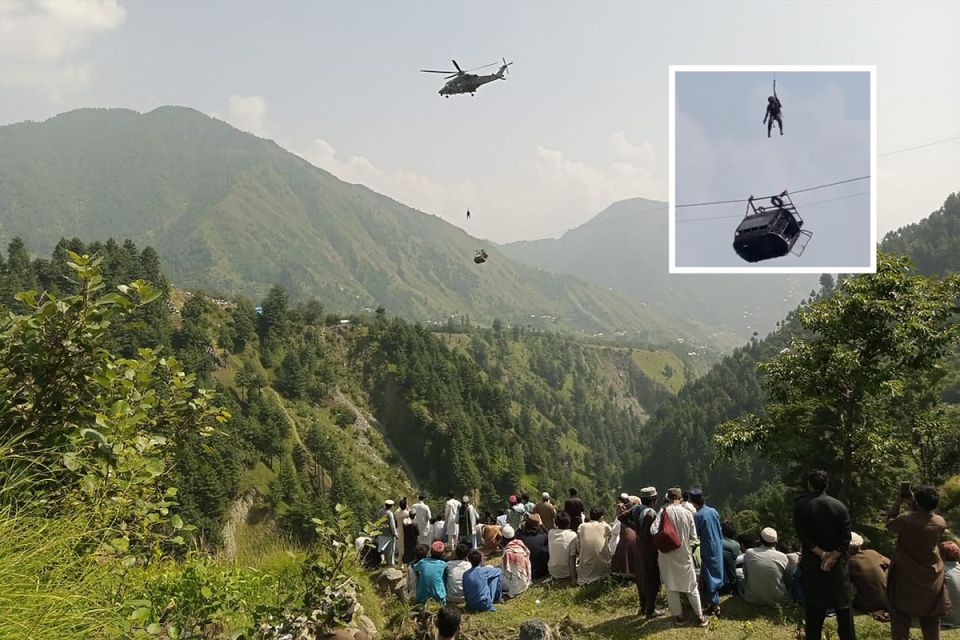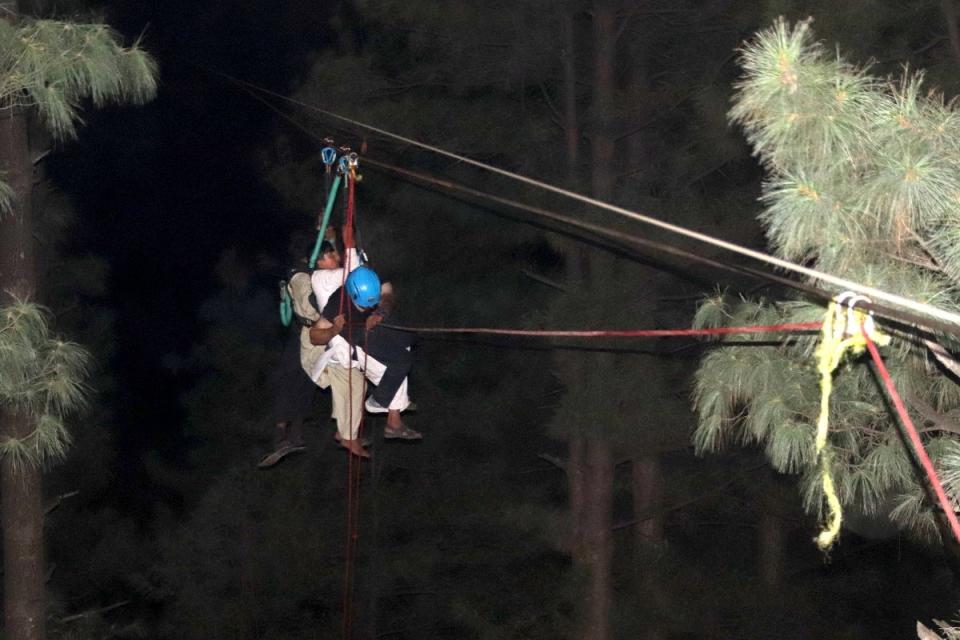Eight people trapped in cable car dangling 900ft over Pakistan ravine saved in dramatic rescue
Eight people were pulled to safety on Tuesday after a dramatic rescue effort hauled them from a cable car left dangling 900ft (274m) above a ravine in northwest Pakistan.
One of the two cable lines carrying the car snapped at around 0700 local time [GMT 0200] as six children were travelling to school alongside two adults in a remote mountainous area in Battagram, Khyber Pakhtunkhwa province, about 200km (124 miles) north of the capital Islamabad.
Despite a desperate rescue mission, most of the pasengers were still trapped well into the night as the car clung to the lone cable, while local residents watched on anxiously from below and crowds gathered around televisions in offices, shops, restaurants and hospitals across Pakistan to watch the operation unfold.
Army commandos were called in as three helicopters initially scrambled to save those onboard, with efforts impeded by high winds and another rope some 30ft above the cable car.

The commandos initially managed to get food and medicine to the passengers in the cabin, which is believed to be used by dozens each day to cross the river to nearby schools, government offices and other businesses. Known by locals as “Dolly”, the cable car links the village of Jangri to Batangi, where the school is located.
“The terrain below is difficult given the peaks and the river flowing underneath in the valley,” said Bilal Fiazi, a spokesperson for the 1122 rescue service.
“Our situation is precarious, for god’s sake do something,” Gulfaraz, a 20-year-old on the cable car, told local television channel Geo News over the phone, appealing to authorities to rescue them as soon as possible.
He said the children were aged between 10 and 15 and one had fainted due to heat and fear. It was reported by local media that one of the children on board had a possible heart condition.

But television footage appeared to show one schoolchild being winched to safety on a zip line in a harness shortly before night fell, with another said to have been rescued before the helicopter operation was grounded at around 1900 local time [GMT 1400].
Despite conflicting reports that four children had been pulled to safety at that point – and confusion over the ratio of children and adults onboard – it appears that six people remained onboard as the sun went down.
Floodlights were installed and an official said that cable crossing experts had been sent by the military to the area and would try to rescue the children by transerring them one by one on a smaller cable car, or trolley, along a cable.
Local residents said community members from surrounding areas who had experience rescuing people this way had also arrived.
A video shared by a rescue agency official showed more than a dozen rescuers and locals lined up near the edge of the dark ravine, pulling on a cable until a boy attached to it by a harness reached the hillside safely to cries of “God is great”.

“It is a slow and risky operation. One person needs to tie himself with a rope and he will go in a small [trolley] and rescue them one by one,” Abdul Nasir Khan, a nearby resident told Reuters.
Just before 2300 local time [GMT 1800], Pakistan’s interim prime minister Anwaar ul Haq Kakar announced that all the children onboard had been successfully rescued.
Moments later, his interior minister Sarfraz Bugti announced that the rescue mission had concluded successfully, as he expressed his appreciation “for our valiant armed forces personnel, administration and locals for their selflessness and determination in carrying out this complex operation”.
The rescue efforts had transfixed the country, while villagers had lined the slopes of the valley and appeared to have been eager to do all they could to rescue those trapped above.
“An extremely difficult and complicated operation has been successfully completed by the Pakistan military,” the military said in a statement. “All stranded persons were safely evacuated and moved to a safe place ... civil administration and locals also actively came forward to participate in this operation.”
Ten people were killed when a cable car lift installed by local villagers in the popular mountain resort of Murree broke and fell into a ravine hundreds of feet deep in 2017.
Mr Kakar said he had “directed the authorities to conduct safety inspections of all such private chairlifts and ensure that they are safe to operate and use”.
Reuters and Associated Press contributed to this report


